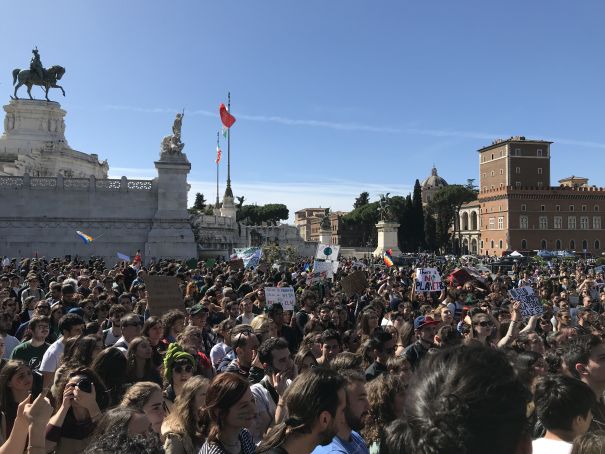By Isabella Todini, age 17, grade 11, St Stephen's School, Rome.
“By choosing the path of indifference we are consciously giving up on the life, home and happiness of the future generations of this Earth.”
St Stephen’s junior Camille Wefers Bettink has been the leading force for climate action on campus, and the face of the Plastic Reduction Campaign, a project aiming to identify, measure and reduce the presence and use of plastic at all RISA schools (Rome International School Association) by 2020.
The method of the campaign is simple: there are seven indicators against which each school is invited to evaluate their use of plastic. The indicators range from teacher engagement to plastic in furniture and school supplies, to the plastic used in the school bars and cafeterias. The goal is to make each school and their respective community aware that their actions can and will be measured and to provide them with honest insight into their plastic usage and areas for improvement.
Wefers Bettink launched the campaign to over 200 participants at the RISA conference in March, encouraging all present to consider the impact that they as individuals and as schools have on the environment, and thus the power they hold to enact positive change. Unsurprisingly, she was met with overwhelming support, including Head of School Eric Mayer who affirms that “everyone agrees it’s a good idea.” St Stephen’s Green Council club supervisor Dr Rebecca Raynor adds that she “[supports] this campaign whole-heartedly because plastic pollution is devastating the earth and its ecosystems...we can play an active role in reducing the amount of plastic we use and in opting for sustainable alternatives.”

As with any ambitious and provocative campaign, it is likely that this project will encounter challenges. Mayer isolates some of the challenges that Wefers Bettink and the campaign may face on their path to the full reduction of plastic in RISA schools, such as the need to spend more money on sustainable materials or to go without some ordinary commodities such as single-use tableware.
It remains true that the dedicated are young and are few, while the supporters prefer to stand on the sidelines and watch the attempts at change making. Wefers Bettink points out that “the biggest challenge up until now has been that of making people care.” Getting people to care and to manifest that drive and enthusiasm for the campaign into tangible action is crucial to the campaign’s success. Ultimately, it comes down to a choice to do something, a choice to prioritise the reduction of plastic. “We chose to care because all of us felt that the way we look at our planet has to change," says Wefers Bettink, speaking for the students working with her on the campaign. Mayer, Raynor and Wefers Bettink agree that it will take conscious action on the part of the entire school community to really make a difference.
However, Wefers Bettink is ready to go the extra mile to ensure that she is doing her part to distance herself from plastic. She attests that the path she has chosen is “the one with more small sacrifices to make, yet the greater satisfaction and better results to gain.” With this in mind, she and her like-minded peers are encouraging other students to learn more about their role in the fight for climate justice.
Just a few weeks ago, members of the Green Council presented one of the seven indicators to the St Stephen’s student body: student engagement. They put emphasis on the facts and statistics, doing their best to prove to any skeptics that there was scientific evidence to support their cause. These efforts are not in vain, as students discuss the campaign in the hallway in between classes and continue to share information amongst themselves about the reality of climate change, but there is still a ways to go.
“We hope to unite students, teachers, and staff in believing in this cause and in bringing about change.” The energy that Wefers Bettink and her Green Council peers in with regard to this campaign is inspiring. They are, without a doubt, among the leaders of the Rome climate justice movement, working towards a greener, cleaner future for us all.
This article was published in the Junior section of the June 2019 edition of Wanted in Rome magazine.
WANTED IN ROME JUNIOR: For young writers and artists
Wanted in Rome is accepting creative contributions from students in all international schools in Rome. Articles on topics related to either the student’s life in Rome or their school projects can be submitted by their class teachers. The work should be no more than 1,000 words and all contributions should contain the name, age and school of the students. We also accept illustrations. Any class teachers who would like to propose a project please contact editorial@wantedinrome.com.
General Info
View on Map
Wanted in Rome Junior: Rome's international schools prioritise reduction of plastic
Via Aventina, 3, 00153 Roma RM, Italia


















